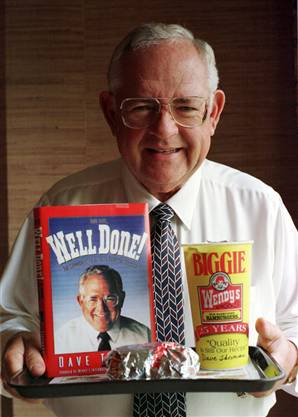We all associate celebrities and public figures with brands and products. There’s Jared from Subway, Justin Long and Apple, Paul Reiser and AT&T One Rate Plus. OK, that last one was a joke, but true (though I’m sure this newest generation is neither familiar with the actor or service… or touch-tone phones).
Sometimes, a person transcends a brand or becomes their own- Michael Jordan with Air Jordan, Derek Jeter’s 24 Hour Fitness, and countless fashion designers. But there are also in-between scenarios when people become so synonymous with a brand that they become the face of a company- for better or for worse.
Sometimes, it makes perfect sense- like Dave Thomas and Wendy’s (he was the founder). Other times, it’s a stroke of luck, like Andy Azula (you may never have known his name, but you’ve definitely seen his face. He’s the UPS whiteboard guy, and actually the creative director who had a hand in thinking up the commercial concept).
So is it prudent to put all of your eggs in one basket in terms of branding/presenting the face of your company?

Let’s take the Dave Thomas Wendy’s example. He had been a great spokesman for 13 years and was perfect for the brand (since the company was in essence his). But when he died in 2002, due to health complications, the company took a huge hit in the advertising space. Wendy’s no longer had a face and was forced to reinvent itself. They tried to leverage Wendy herself (a caricature of Dave’s daughter), but that was very forgettable. In fact, it’s been 8 years, and I doubt if any significant number of people could name a specific Wendy’s ad campaign from the last two (sorry Kirshenbaum Bond Senecal + Partners). We certainly haven’t had another “Where’s the beef?” moment.
On the other hand, let’s take a look at Tiger Woods. He was, at one point, an almost ideal spokesperson for sports-related products. We had the Nike and the Gatorade sponsorships. But then all of his many sexual infidelities reared their ugly heads, and the companies that endorsed him had to make an important choice. Nike famously backed Woods and acknowledged his problems. Gatorade, however, dropped him quickly. The sports drink company could afford to. The Gatorade brand was already well-positioned and built up. The company also had a slew of other available sports stars at their disposal to take Tiger’s place. Now imagine if instead of Gatorade, a smaller up-and-coming company paid for the face of Tiger as its exclusive spokesperson. It probably wouldn’t have the luxury of a star-studded celebrity supporting lineup. But their brand would also suffer a huge blow from which a smaller company might not recover.
So back to the question at hand: should you trust your brand identity to a single person? Well, it depends. Sometimes you take what you can get. Other times, you keep backup options, because scandal and death could always be around the corner. Either way, you should always have a backup plan. No excuses.
One more extreme example- anyone remember those ShamWow commercials with their overly annoying spokesperson Vince? Well, he was charged with beating up a prostitute. Not exactly great PR…

